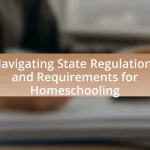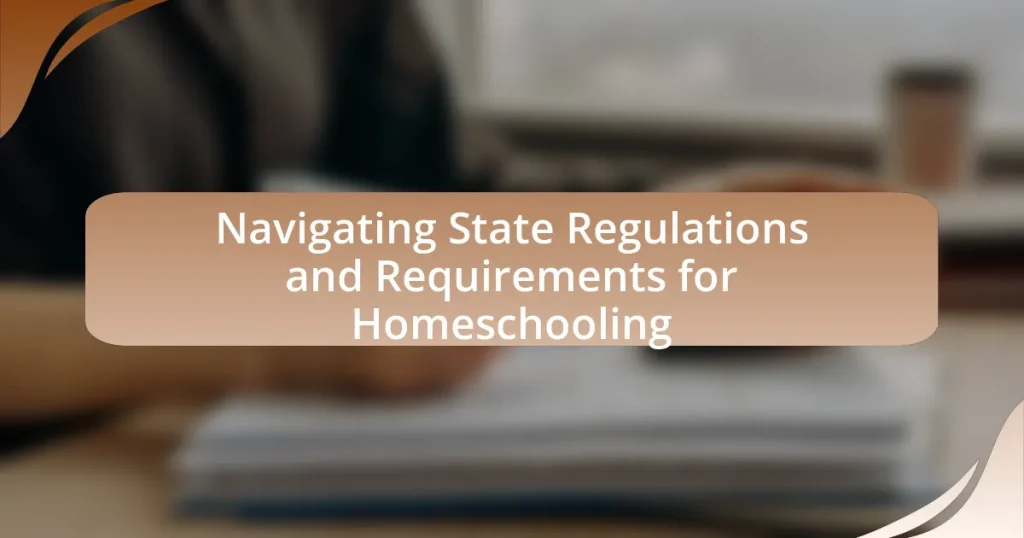The article focuses on navigating state regulations and requirements for homeschooling in the United States, highlighting the significant variations in laws across different states. It outlines key regulations such as notification requirements, curriculum standards, assessment mandates, and record-keeping obligations that parents must adhere to. The article also discusses the implications of non-compliance, the documentation typically required, and the resources available for families to ensure they meet state laws. Additionally, it examines how different states approach homeschooling oversight, identifying those with lenient versus strict regulations, and offers best practices for maintaining compliance.
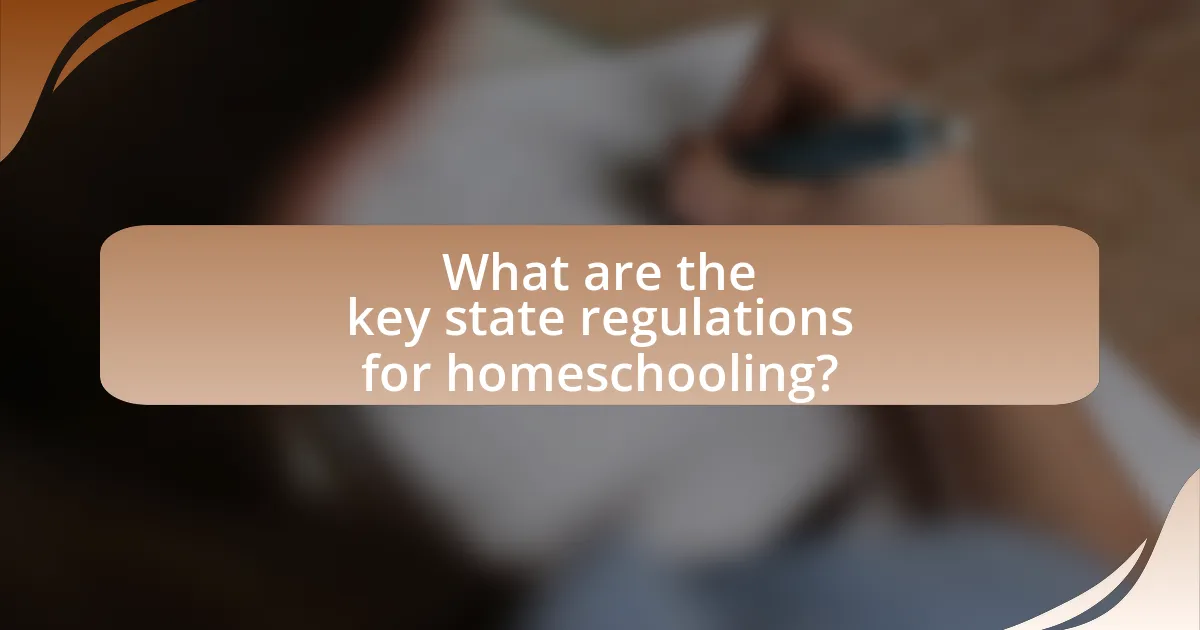
What are the key state regulations for homeschooling?
Key state regulations for homeschooling vary significantly across the United States, with each state having its own specific requirements. Generally, these regulations include notification requirements, curriculum standards, assessment mandates, and record-keeping obligations. For instance, some states require parents to submit an intent to homeschool, while others may mandate standardized testing or portfolio reviews to ensure educational progress. According to the National Center for Education Statistics, as of 2020, approximately 3.7 million students were homeschooled in the U.S., highlighting the importance of understanding these diverse regulations to ensure compliance and effective education.
How do state regulations vary across the United States?
State regulations for homeschooling vary significantly across the United States, with each state having its own set of laws and requirements. For example, some states, like Texas and Alaska, have minimal regulations, allowing parents considerable freedom in how they educate their children, while others, such as New York and California, impose strict guidelines, including mandatory assessments and detailed curriculum submissions. According to the National Center for Education Statistics, as of 2020, approximately 3.7 million students were homeschooled in the U.S., reflecting the diverse regulatory landscape that influences parental choices and educational approaches.
What are the most common types of regulations in different states?
The most common types of regulations for homeschooling in different states include notification requirements, curriculum mandates, assessment obligations, and record-keeping rules. For instance, some states require parents to submit an intent to homeschool, while others mandate specific subjects to be taught. Additionally, many states have standardized testing requirements to assess student progress, and some require parents to maintain educational records. According to the National Center for Education Statistics, as of 2020, 36 states have some form of notification requirement, and 22 states require standardized testing for homeschooled students, illustrating the diversity in regulations across the country.
How do these regulations impact homeschooling families?
Regulations significantly impact homeschooling families by dictating the curriculum, assessment methods, and reporting requirements they must follow. For instance, some states require standardized testing or portfolio reviews, which can create additional stress and workload for families. Additionally, regulations may limit the flexibility of educational approaches, as families must align their teaching methods with state standards. In states with stringent regulations, families may face challenges in accessing resources or support, which can hinder their ability to provide a comprehensive education.
What documentation is typically required for homeschooling?
Documentation typically required for homeschooling includes a notice of intent to homeschool, an educational plan or curriculum outline, and attendance records. Many states mandate that parents submit a notice of intent to their local school district, which formally indicates their decision to homeschool. Additionally, an educational plan detailing the subjects to be taught and the methods of instruction is often required to ensure compliance with state educational standards. Attendance records are also necessary to track the number of instructional days, as some states have specific requirements for the minimum number of days of instruction per year. These documentation requirements vary by state, reflecting the diverse regulations governing homeschooling across the United States.
What forms must parents submit to comply with state laws?
Parents must submit a notice of intent to homeschool, which is required by most states to comply with state laws. This form typically includes information such as the child’s name, age, and educational plan. Additionally, some states may require an educational assessment form or proof of curriculum choice, while others may mandate periodic progress reports or standardized testing results. Compliance with these requirements ensures that parents meet state educational standards and regulations for homeschooling.
How do record-keeping requirements differ by state?
Record-keeping requirements for homeschooling differ significantly by state, with some states mandating detailed documentation while others have minimal or no requirements. For instance, states like California require parents to maintain attendance records, course descriptions, and samples of student work, whereas states such as Texas only require parents to submit an affidavit of intent to homeschool without further documentation. This variation is supported by the National Center for Education Statistics, which highlights that 29 states have specific record-keeping laws, while 21 states do not impose any formal requirements.
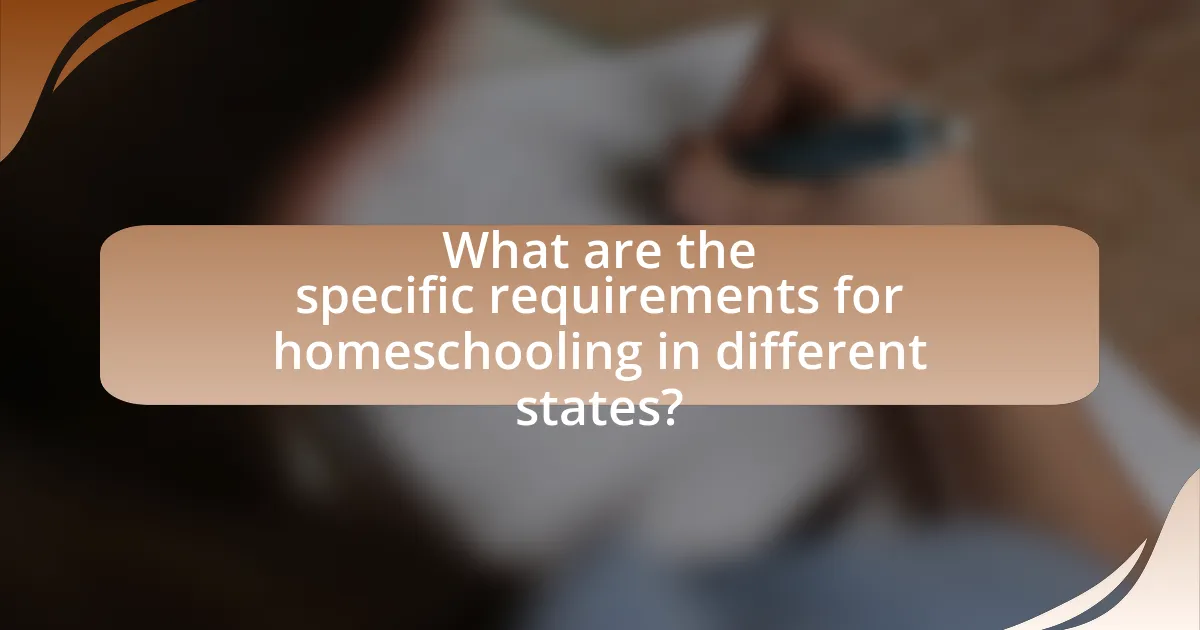
What are the specific requirements for homeschooling in different states?
Homeschooling requirements vary significantly across states in the U.S. For example, in California, parents must file an annual private school affidavit and maintain educational records, while in Texas, parents are not required to notify the state but must provide a curriculum that includes reading, spelling, grammar, mathematics, and good citizenship. In New York, parents must submit an Individualized Home Instruction Plan (IHIP) and provide quarterly reports. Each state has its own regulations regarding notification, curriculum, assessment, and record-keeping, reflecting diverse educational philosophies and legal frameworks.
How do states differ in their approach to homeschooling oversight?
States differ significantly in their approach to homeschooling oversight, with some requiring minimal regulation while others impose strict guidelines. For instance, states like Texas and Alaska have few requirements, allowing parents to educate their children with little to no oversight, whereas states such as New York and Pennsylvania mandate detailed curricula, regular assessments, and submission of educational plans. This variation is evidenced by the National Center for Education Statistics, which reports that as of 2020, 11 states require no notice of intent to homeschool, while 12 states require parents to submit an educational plan and progress reports.
What states have the most lenient homeschooling laws?
The states with the most lenient homeschooling laws are Alaska, Idaho, Illinois, New Jersey, and Texas. These states require minimal oversight and have fewer regulations regarding curriculum, assessments, and notification requirements. For instance, Alaska allows parents to homeschool without needing to submit an educational plan, while Texas does not require any formal notification to the state. This leniency is supported by the fact that these states prioritize parental rights in education, allowing families greater flexibility in their homeschooling approach.
Which states impose the strictest regulations on homeschooling?
The states that impose the strictest regulations on homeschooling are New York, Pennsylvania, and California. New York requires parents to submit an Individualized Home Instruction Plan (IHIP) and conduct annual assessments, while Pennsylvania mandates an evaluation by a qualified evaluator and submission of an affidavit. California has specific notification requirements and mandates that parents keep detailed records of their homeschooling activities. These regulations ensure oversight and accountability in the homeschooling process.
What are the implications of failing to meet state requirements?
Failing to meet state requirements for homeschooling can result in legal consequences, including fines, loss of educational privileges, or mandatory intervention by state authorities. States enforce regulations to ensure educational standards are met; non-compliance may lead to an investigation or the requirement to enroll the child in a public school. For instance, in states like California, failure to submit required documentation can lead to truancy charges. Additionally, families may lose access to resources and support systems designed for compliant homeschoolers, further impacting the educational experience.
What penalties do families face for non-compliance?
Families face various penalties for non-compliance with homeschooling regulations, which can include fines, loss of educational privileges, and mandatory attendance in public schools. For instance, some states impose monetary fines for failing to submit required documentation or assessments, while others may require families to enroll their children in public schools if they do not meet specific educational standards. Additionally, non-compliance can lead to legal action, including truancy charges, which can further complicate a family’s educational options. These penalties are enforced to ensure that children receive an adequate education as mandated by state laws.
How can families rectify issues with state regulations?
Families can rectify issues with state regulations by actively engaging with local education authorities and seeking clarification on specific requirements. This involves reviewing state laws, attending informational meetings, and communicating directly with school district representatives to address misunderstandings or discrepancies. For instance, families can reference the Home School Legal Defense Association, which provides resources and legal guidance tailored to state-specific regulations, ensuring compliance and advocating for their rights.
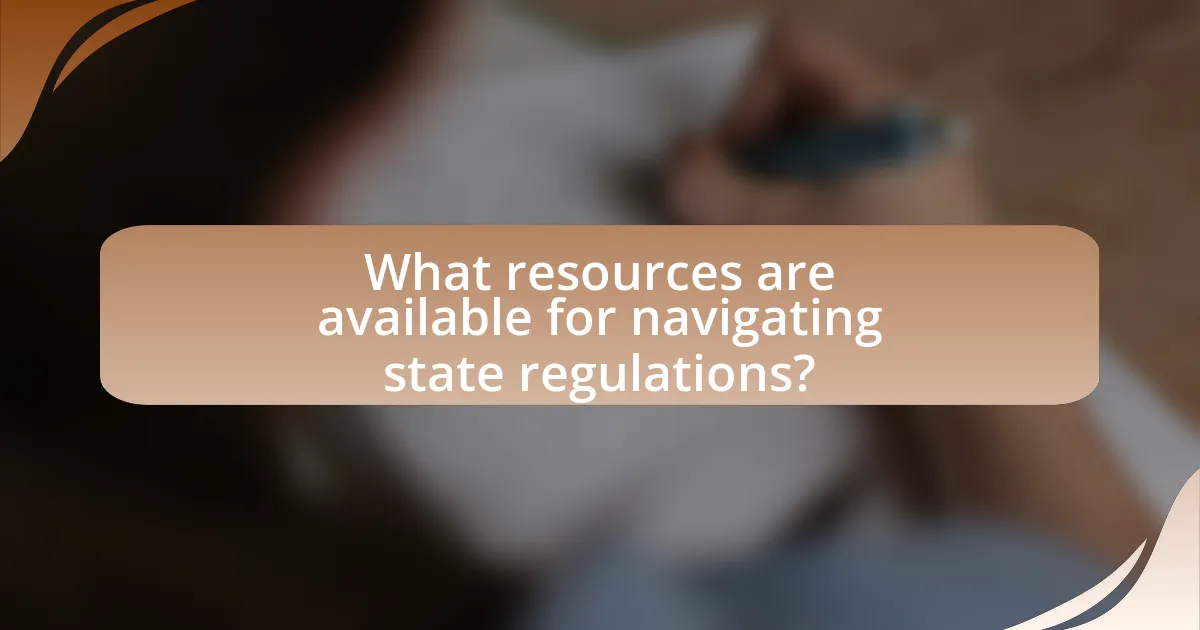
What resources are available for navigating state regulations?
State education departments provide essential resources for navigating state regulations regarding homeschooling. Each state has its own education department website, which typically includes guidelines, forms, and contact information for inquiries. Additionally, organizations such as the Home School Legal Defense Association (HSLDA) offer legal resources and support tailored to specific state requirements. Research indicates that these resources are crucial for ensuring compliance with local laws, as they provide updated information on regulations, deadlines, and necessary documentation for homeschooling families.
How can homeschooling families find reliable information about state laws?
Homeschooling families can find reliable information about state laws by consulting official state education department websites, which provide up-to-date regulations and requirements for homeschooling. These websites typically outline the legal framework, necessary documentation, and any specific guidelines that families must follow. Additionally, organizations such as the Home School Legal Defense Association (HSLDA) offer resources and legal assistance tailored to each state’s homeschooling laws, ensuring families have access to accurate and comprehensive information.
What role do homeschooling associations play in providing guidance?
Homeschooling associations play a crucial role in providing guidance by offering resources, support, and advocacy for homeschooling families. These associations help parents understand state regulations and requirements, ensuring compliance with local laws. For example, they often provide detailed information on legal obligations, curriculum options, and assessment methods specific to each state, which is essential for effective homeschooling. Additionally, many associations organize workshops, conferences, and networking opportunities that connect families with experienced homeschoolers and educators, further enhancing their ability to navigate the complexities of homeschooling.
How can online platforms assist in understanding state requirements?
Online platforms can assist in understanding state requirements by providing centralized access to comprehensive information about homeschooling laws and regulations specific to each state. These platforms often feature user-friendly interfaces that allow parents to easily navigate through state-specific guidelines, deadlines, and documentation needed for compliance. For instance, websites like HSLDA (Home School Legal Defense Association) offer detailed resources, including state-by-state breakdowns of legal requirements, which help parents ensure they meet all necessary criteria for homeschooling. This accessibility to accurate and organized information empowers families to make informed decisions and adhere to state mandates effectively.
What best practices can help families stay compliant with state regulations?
Families can stay compliant with state regulations by thoroughly understanding and adhering to their specific state’s homeschooling laws. This includes researching the required documentation, such as intent to homeschool forms, curriculum guidelines, and assessment requirements. For instance, states like California require families to file an annual Private School Affidavit, while others may mandate standardized testing or portfolio reviews. Regularly reviewing state education department resources and joining local homeschooling associations can provide updates on any changes in legislation and offer support in meeting compliance requirements.
How can families effectively organize their homeschooling documentation?
Families can effectively organize their homeschooling documentation by implementing a systematic filing system that categorizes records by subject, date, and type of documentation. This approach allows for easy retrieval and ensures compliance with state regulations, which often require specific records such as attendance logs, curriculum outlines, and assessment results. For instance, maintaining a digital or physical folder for each subject can streamline the process, while regularly updating these folders with new materials and assessments can help families stay organized and prepared for any state evaluations or inquiries.
What strategies can help families keep up with changing regulations?
Families can keep up with changing regulations by regularly reviewing state education department websites and subscribing to newsletters from homeschooling organizations. These resources provide timely updates on legislative changes and policy shifts that affect homeschooling. For instance, the National Home Education Research Institute offers insights and updates on homeschooling laws, ensuring families remain informed about their rights and responsibilities. Additionally, joining local homeschooling groups can facilitate information sharing among families, helping them stay aware of any changes in regulations within their state.









